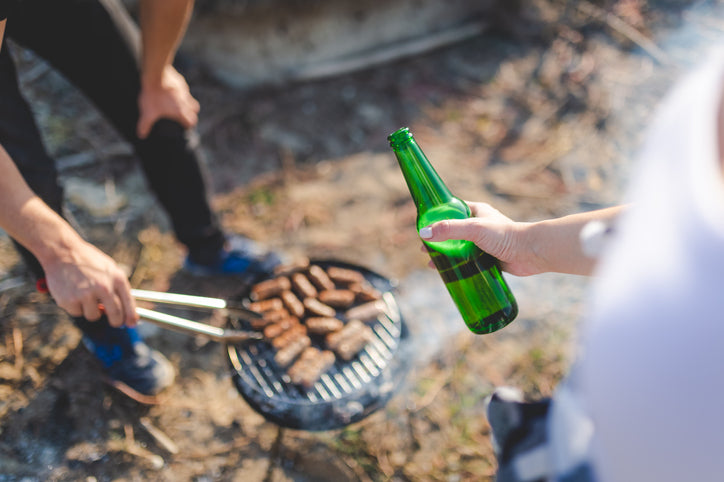
When I write this, it's November and the holiday season is just around the corner. For many, this is a fantastic time of the year filled with weekend barbeques, beers and sunshine. Christmas trees go up, and bank accounts go down.
While mostly great, the increase in festivities during the holiday season has downsides. All the barbeques, beers, and feasts can lead to unwanted fat gain. Research confirms this, showing the holiday seasons are the biggest culprit when it comes to weight gain throughout the year in many countries across the world.
This predicament puts people who are into health and fitness in a precarious situation. On the one hand, you don't want to miss out while everyone else is having fun. But on the other hand, you don't want to undo your hard-earned work throughout the year in a few weeks and have to spend extra time dieting later on to undo the damage.
One option is to say no and practise portion control. But it's not realistic to think that people want to be counting their calories on Christmas day when everyone else is enjoying themselves. Let's face it, you have worked hard all year and deserve to enjoy Christmas feasts with everyone else.
Below we explore realistic hacks you can use to have your Christmas ham and eat most of it too while minimising unwanted fat gain throughout the holiday season.
Make Protein Your Friend - Go For The Christmas Ham
The best strategy to avoid any weight gain over the holiday season is to be selective in the type of foods you load onto your plate (and I don't mean salad).
As mentioned in previous posts, protein is an important macronutrient to focus on when it comes to weight loss. Protein's benefits on weight loss are due to it being highly satiating (eating protein makes you feel fuller for longer as opposed to things carbohydrates and fat), and more thermogenic (you burn more energy digesting it).
 As I am sure that everyone is aware, meat is a good source of protein which is handy for us as most Christmas spreads and barbecues are laden with meat. An excellent holiday strategy is to load your plate up with meat (apologies vegetarians) and minimise going for carbohydrate sources like potato bake and meringue.
As I am sure that everyone is aware, meat is a good source of protein which is handy for us as most Christmas spreads and barbecues are laden with meat. An excellent holiday strategy is to load your plate up with meat (apologies vegetarians) and minimise going for carbohydrate sources like potato bake and meringue.
There is some research to support this strategy too, showing that overfeeding on protein may avoid weight gain altogether.
Opting for protein sources when feasting will leave you feeling satisfied, but help minimise or even avoid any unwanted weight gain.
Fasting - Create A Calorie Buffer
Even if you don't do intermittent fasting (IF), it can be an effective ''one-off'' strategy to use the day of a feast or party where you know you will be consuming a lot of calories.
If you are not aware of IF, it comes in many forms, but the main dietary protocol involves eating all your calories in an 8-hour window and fasting the rest of the time (usually 16 hours fasts). IF allows you to get all your calories in 2 -3 bigger meals as opposed to 4-6 smaller ones and still be burning more calories than you are consuming.

How do you use IF in the holiday season as a one-off strategy? Let's say you know you have an afternoon Christmas barbecue and there is going to be a lot of calories there. Instead of eating your typical breakfast and lunch, you fast up until the afternoon (if you get really hungry you can have a lower-calorie snack like a protein bar, or low carb Gym meal). When the barbecue comes around, you go all out, loading up on the protein like discussed above and eating as much as you want and maybe even in throwing in some potato bake for good measure.
Chances are the protein will fill you up pretty quick, however, because of the fast, you have eaten fare fewer calories for the day than you would usually have if you feasted on top of your typical meals.
Obviously, I wouldn't recommend doing the above every day, but a few days a year during the holiday season, fasting on the day of a feast can be a useful little trick to keep overall calorie consumption down.
Mini Diet - Create A Bigger Calorie Buffer
While I wouldn't advocate crash dieting, sometimes a few days of solid dieting before a calorie-dense weekend can be god strategy to minimise weight gain in the holiday season.
Let's say you overbook yourself on the weekend. You've got the work Christmas dinner on Friday night, barbeque on Sunday evening and maybe even a dinner on Saturday too, all of which are going to be laden with calories that you will be socially obliged to consume. So what do you do?
 In anticipation of the big calorie-dense weekend, you diet for the week before it, limiting calorie intake (go with the low-calorie Gym Meals / use the weight loss meal planner, for example).
In anticipation of the big calorie-dense weekend, you diet for the week before it, limiting calorie intake (go with the low-calorie Gym Meals / use the weight loss meal planner, for example).
The dieting during the week prior creates a calorie buffer so at the end of the weekend after you've overindulged, you've at least offset most of the damage, stopping unwanted weight gain or at the very least minimising it. Following this strategy, the calorie intake for the week ideally ends up evening itself out, and while you probably gained fat for two days of the weekend, you lost fat during the week.
Wrapping Up
As I have clarified above, these hacks are realistic. Most blog posts or articles about holiday eating recommend exercising portion control or even bringing your own food. While this might be the best-case scenario, it isn't the most achievable. However, if you have the will power for that go ahead. This post is aimed at people who want to enjoy the festivities while minimising weight gain.
Summarising:
- Focus on eating protein sources; this will increase satiety and minimise fat gain.
- Try a one-off fast leading up to a feast. This fast will create a calorie buffer and lead to you consuming fewer calories overall.
- Try mini diets during the week before a weekend of excess calorie consumption; this will help offset the unwanted weight.
Happy holidays!
-Gym Meals
